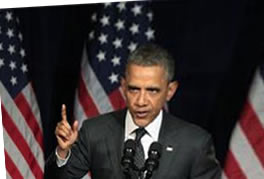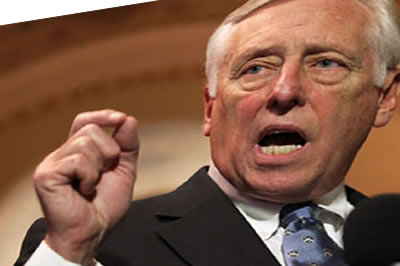Washington Gridlock, No One Is Willing to Pay the Political Price to Cut Spending
Politics / US Politics Mar 16, 2012 - 03:33 AM GMTBy: Casey_Research
 The Editors of The Casey Report, Casey Research: The first session of this 112th Congress was spent with Democrats and Republicans at loggerheads over the debt ceiling, taxes, spending cuts, the deficit super committee, appropriations bills and finally the extension of unemployment compensation and a two-month extension of the payroll tax cut. Standard and Poor's downgrade of the United States' federal debt was due in part to all the haggling over how, and actually whether, to reduce the debt.
The Editors of The Casey Report, Casey Research: The first session of this 112th Congress was spent with Democrats and Republicans at loggerheads over the debt ceiling, taxes, spending cuts, the deficit super committee, appropriations bills and finally the extension of unemployment compensation and a two-month extension of the payroll tax cut. Standard and Poor's downgrade of the United States' federal debt was due in part to all the haggling over how, and actually whether, to reduce the debt.
No One Is Willing to Pay the Political Price to Cut Spending
This year Obama asked Congress for, and was given, an additional $1.2 trillion of borrowing authority, which will increase the debt limit to $16.4 trillion, just enough to get him past the 2012 election. It could be close, however. If budget projections prove to be overly optimistic, Obama could face another cliffhanger over a further increase in the debt ceiling in the midst of the presidential election in November. How embarrassing to have to say "re-elect me – and by the way, I need to borrow some more money to pay this month's bills."

President Barack Obama
Sometime early in January, the US crossed the line at which its national debt exceeds its gross domestic product of $15.1 trillion. Each party blames the other, but in truth, almost no one in the federal government is willing to bite the bullet and make necessary cuts. Everyone hopes someone else's ox will be gored.
The federal government's expenditures have been exceeding its revenues by about $107 billion per month so far in fiscal year 2012. At that rate, there will only be about $100 billion of this additional $1.2 trillion of borrowing authority left come November. That's not much breathing room.
After the Republican-controlled House of Representatives voted to reject the president's request for authorization to borrow another $1.2 trillion, House Speaker John Boehner (R-OH) said the vote "is an indictment of the administration's reckless spending binge that has driven America's economy down a disastrous fiscal path ... the most rapid increase in debt under any US president." Boehner noted that the national debt has increased more than $4.6 trillion since Obama took office.
While the House vote may seem like an encouraging gesture, it is ultimately irrelevant. Under the deal cut last summer, a majority of both houses of Congress would be required to block the debt limit increase, but even then the president could veto it. Simply, if the Democrat Senate joined the House in rejecting the increase, there's no way a 2/3 majority of both houses could have been summoned to override a presidential veto.
At Loggerheads
Both parties accuse the other of obstruction. Senate Majority Leader Harry Reid (D-NV) observed that "we've spent months on things that used to happen just matter-of-factly." He added that "the Senate works on consensus, and we haven't been able to get that because the Republicans [are engaged in] obstructionism on steroids." He accused Republicans of using Senate rules friendly to the minority, namely the filibuster, to thwart his agenda. On the other hand, John Boehner's spokesman, Michael Steel, said "the House passed nearly 30 jobs bills with bipartisan support, but Senate Democratic leaders have refused to act." Representative Pat Meehan (R-PA) said that if only the Democrat-controlled Senate and President Obama would work with Republicans, Congress could "end the gridlock and get our economy moving... Our economy faces serious challenges right now – gridlock in Washington doesn't have to be one of them."
Obfuscation
A recent Gallup poll gives Congress a bipartisan approval rating of only 13%. This exasperation with Congress is certainly tied to gridlock and obstruction, but we are also faced with so much obfuscation that there is no telling who is at fault.
For example, a bill to extend the two-percent payroll tax cut for a full year was passed by the Republican-led House, but not by the Democrat-controlled Senate. The tax cuts were to expire on December 31, 2011. Both parties had attached other provisions or qualifications to their versions of the legislation that the other party in turn opposed. Yet both parties tried to gain political points by accusing the other of simply opposing extending the payroll tax cut. For example, House Minority Whip Steny Hoyer (D-MD) accused: "You're walking out, you're walking away, just as so many Republicans have walked away from middle-class taxpayers."

House Minority Whip Steny Hoyer
But in reality, the Republicans were proposing to extend the tax cuts for a full year, and Hoyer's party proposed extending for only two months. Obfuscation at its finest.
Legislative Futility
Since 1947, the Congressional Record has included the Résumé of Congressional Activity at the end of each year. The Washington Times recently analyzed these reports and concluded that "Congress set a record for legislative futility by accomplishing less in 2011 than any other year in history." What was accomplished consisted mostly of things like naming post offices and extending existing laws. The House and Senate often failed to reach agreement in conference, and the Senate often failed to reach agreement within its own chamber. Hoyer said 2011 was "as unproductive a session as I have served in since I came to Congress 30 years ago."
The Senate continues to abdicate its responsibilities by failing to unveil a budget rather than risk putting forward a plan that results in political backlash in an election year. Sarah Binder, both of Brookings Institute and a professor at George Washington University, observed that it's hard to get things done "when revenues aren't growing and the decisions are how to cut, and how to cut long term." She said that it is harder for Congress to compromise on spending quarrels "because the two parties are drastically opposed on fundamental principles."
There's little hope in the near future; this second session of the 112th Congress will suffer from election-year paralysis. Senator Joe Manchin (D-WV) said of gridlock in the coming year: "You think this is bad? You ain't seen nothing yet." As a candidate in 2008, Obama promised to transcend partisanship. Instead, Congress and the nation seem more polarized than ever.
Embracing Gridlock
Gridlock may be the nation's salvation, an encouraging sign that the ever-expanding leviathan is collapsing under its own weight. Robert Heinlein would undoubtedly welcome the gridlock we see today on Capitol Hill. In The Moon Is a Harsh Mistress, Heinlein's character, Professor Bernardo de la Paz, advises a constitutional committee as follows:
I note one proposal to make this Congress a two-house body. Excellent, the more impediments to legislation the better. But, instead of following tradition, I suggest one house legislators, another whose single duty is to repeal laws. Let legislators pass laws only with a two-thirds majority ... while the repealers are able to cancel any law through a mere one-third minority. Preposterous? Think about it. If a bill is so poor that it cannot command two-thirds of your consents, is it not likely that it would make a poor law? And if a law is disliked by as many as one-third, is it not likely that you would be better off without it?
Gridlock by design? He was on to something. Here's to hoping they don't find a solution.
[Misleading rhetoric can be found practically anywhere someone wants something from another. Download a free report on the top ten misleading ETFs to avoid putting your investment funds in an undesirable place.]
© 2012 Copyright Casey Research - All Rights Reserved
Disclaimer: The above is a matter of opinion provided for general information purposes only and is not intended as investment advice. Information and analysis above are derived from sources and utilising methods believed to be reliable, but we cannot accept responsibility for any losses you may incur as a result of this analysis. Individuals should consult with their personal financial advisors.
© 2005-2022 http://www.MarketOracle.co.uk - The Market Oracle is a FREE Daily Financial Markets Analysis & Forecasting online publication.



